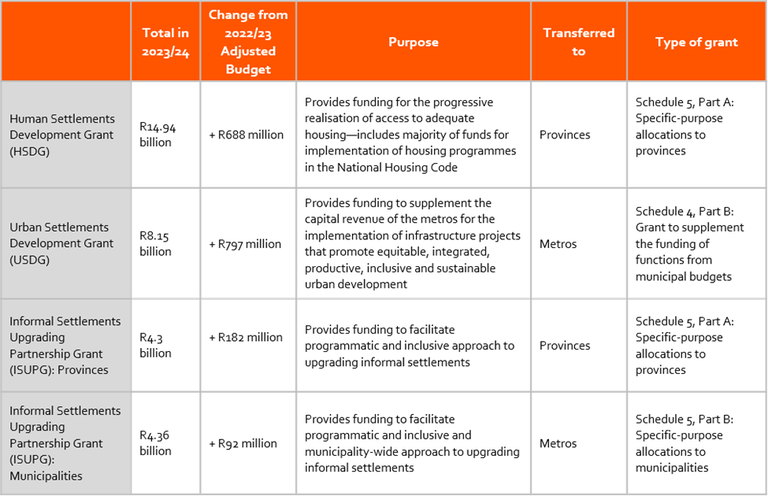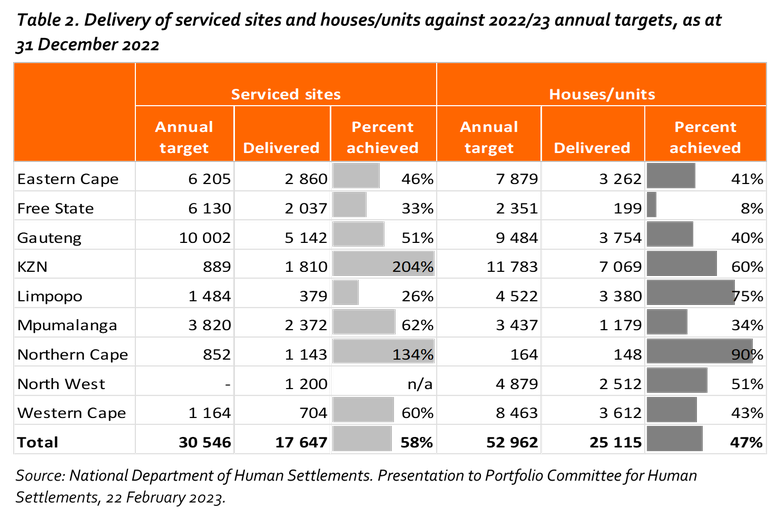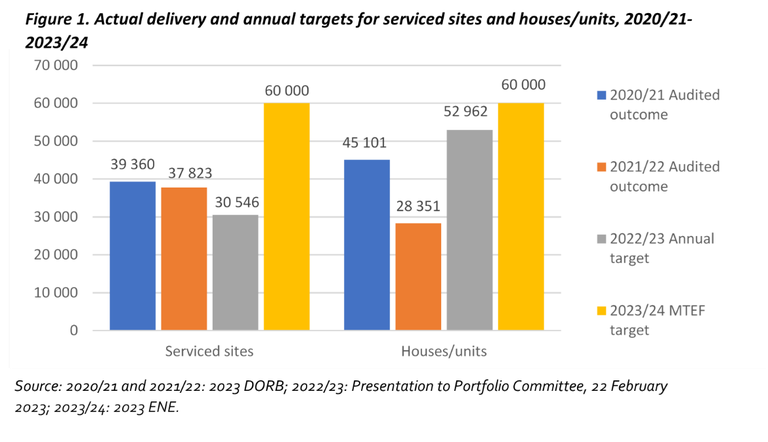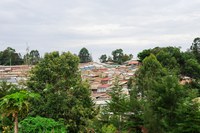Human Settlements in the 2023/24 Budget
This Focus Note examines the 2023 medium term budget of the national department as well as spending to date on 2022/23 allocations, with a particular focus on transfers to provinces and municipalities for the implementation of critical housing subsidy programmes. The purpose is to identify the critical points from the recently-tabled budget which are important for housing sector practitioners.
1. Overview of 2023/24 National Department Budget
Vote 33 of the national budget remains a critical pillar for the delivery of government’s economic growth and development agenda, with human settlements constituting the 9th largest national department by budget size. The total budget of the National Department of Human Settlements (NDHS) grows by 4.4% in 2023/24, to reach R34.942 billion in total. In 2020/21 the department budget was severely cut by 13.7% due to fiscal consolidation in the first year of COVID-19 and the national lockdown. Since then, the department has enjoyed a steadily increasing allocation, increasing by over 8% last year (nominally) in the 2022/23 budget. After two years of recovery, last year the departmental budget caught up to the amount the department was receiving back in 2019/20, prior to the pandemic. This trend is set to continue with a nominal average annual growth rate of 4.38% over the medium term.
The 2023/24 budget of R34.9 billion is actually an increase of R485 million compared to the baseline as published in last year’s budget. Therefore, this year the department is receiving R1.46 billion more than last year’s adjusted budget, and R485 million more than was expected for this year.
2. Conditional grants to provinces and municipalities
Given the concurrency of the human settlements function, the national department transfers the majority of its budget to municipalities and provinces as its implementing agencies. Provinces are allocated 55% of the department budget in conditional grants, while municipalities are set to receive another 36%. With a further 5% transferred to entities, the department itself spends just 3% of its total budget. Table 1 summarises the conditional grants administered by the NDHS in the 2023 MTEF.
Table 1. Summary of Human Settlements Conditional Grants, 2023/24
Source: National Department of Human Settlements. Presentation to Portfolio Committee for Human Settlements, 22 February 2023
Human Settlements Development Grant (HSDG)
The HSDG is the largest conditional grant in the human settlements sector and the primary tool used to resource the provinces to implement the subsidy programmes contained in the National Housing Code. The total HSDG grows by 4.8% compared to last year, reaching R14.944 billion in 2023/24. With a total of R45.86 billion allocated over the MTEF, the HSDG increases nominally by an average of 3.5% a year over the medium term.
Typically, expenditure of the HSDG is good: in 2020/21, 96% of the funds available were spent and in 2021/22, the figure was 97% (see page 183 of the 2023 Division of Revenue Bill). As of 31 January 2023, one month into the last quarter of the financial year, a total of 70% of the total R14.57 billion available in HSDG funds for 2022/23 had been spent by the provinces, leaving R4.43 billion to be spent in February and March (see Human Settlements Grants Performance as per 31 January 2023: Preliminaries. Presentation to Human Settlements Technical MINMEC, 13 February 2023).
One of the reasons a high expenditure rate is achieved by the year’s end is that the Department, through MINMEC, usually elects to shift funds between provinces mid-year, from slower spending provinces to provinces with performing projects. In 2022/23, R100 million was stopped from the Free State and Limpopo each, and reallocated to Mpumalanga and Northern Cape, as per Sections 18 and 19 of the Division of Revenue Act. This practice ensures that funds are retained by the sector and reallocated where they will be utilized before year end.
It is important to compare expenditure rates to non-financial targets in order to get a view of value for money. Data for delivery as of 31 January 2023 is not available publicly, but Table 2 shows delivery information for one month earlier, as of 31 December 2022. At this point at the end of the third quarter, provinces had completed 17 647 serviced sites, or 58% of the total target for 2022/23. Progress against the number of houses/units completed was slightly worse: 47% of the annual target achieved at the end of the third quarter. Given the size of their targets,

delivery in Gauteng and KZN are the provinces to watch, as their numbers largely determine the sector’s overall progress.
Urban Settlements Development Grant (USDG)
The total USDG allocation increases by 10.8% in 2023/24, to reach R8.15 billion. In the 2023 MTEF, the baseline of the USDG has been revised to include an additional R2.2 billion that has been added from the Budget Facility for Infrastructure (BFI) for two large-scale infrastructure projects in eThekwini and Johannesburg (see W1 Annexure to 2023 Budget Review, page 51). The BFI is “a reform to the budget process that establishes specialized structures, procedures and criteria for committing fiscal resources to public infrastructure spending” (see 2023 Budget Review, page 161). Together the Gauteng metros receive half of the total USDG in 2023/24.
It is important to note that, although the USDG is administered by NDHS, within the metros it is split between various departments, and not spent entirely by the Human Settlements departments of the metros. A substantial portion of USDG funds are routed to Roads and Stormwater, Water and Sanitation and Electricity upon receipt by the metro. This is entirely within the mandate to spend on built environment priorities and infrastructure for integrated human settlements, but it does create a more complex situation for reporting and monitoring spending across sectors and departments. In 2022/23, one third of the USDG was allocated for water and sanitation, with another 25% to housing and human settlements (see Delivery Trends / Non-Financial Performance: HSDG and USDG for the Period Ended 31 December 2022. Presentation to Portfolio Committee for Human Settlements, 22 February 2023).
As of 31 January 2023 (7 months into the municipal financial year), in total the metros had spent 35% of the total voted USDG funds for 2022/23, leaving just five months to spend the balance of R4.79 billion. In the past, when there have been issues with spending on the USDG (largely due to delays in the pipeline and procurement issues), NDHS has stopped and reallocated funds to different metros. In the current financial year, the Department intends to shift funds away from Mangaung, Ekurhuleni and eThekwini—it remains to be seen if these shifts will succeed in improving the spending rate for the USDG for the current financial year (see Municipal Grants Performance as per 31 January 2023: Preliminaries. Presentation to Portfolio Committee for Human Settlements, 22 February 2023).
Informal Settlements Upgrading Partnership Grant (ISUPG)
The ISUPG is a relatively new grant, first introduced in 2021/22 to intensify efforts to upgrade informal settlements in partnership with communities. In total, over the MTEF, the two grants amass to a little over R27 billion, roughly half to provinces and half to the metros.
As might be expected, the initial roll out of the grant saw low expenditure. The latest available spending data for 2022/23 is as of 31 January 2023, one month into the fourth quarter for the provinces. At this point, only three provinces had spent more than 75% of the total funds available to them. Admittedly infrastructure spending is typically ‘lumpy’, but these figures still suggest a slow pace. The metros are also struggling: on 31 January 2023, one month past the midpoint of the municipal financial year, only 32% of the total available funds had been spent and 55% of the transferred funds were spent.
3. Looking forward
The Budget Speech on 22 February 2023 came in the context of high inflation and increasing interest rates, which are putting pressure on home-buyers, home-owners, and tenants. Within the human settlements sector, the last year has seen increased attention on improving the up-take of the FLISP subsidy, recently relaunched as First Home Finance, and on the upgrading of informal settlements, with the rollout of year 3 of the dedicated conditional grant for metros and provinces. In the recent State of the Nation Address (SONA), the President also emphasised the need to expedite the provision of title deeds for government-subsidised houses, in order to unlock this asset for poor households.
Although human settlements did not feature in the Budget Speech, the Minister of Finance did announce a 10% increase in the threshold for transfer fees on purchases of residential property. Previously there were no transfer duties for properties valued R1 million or below; as of 1 March 2023, this threshold is increased to R1.1 million, meaning that the first 1.1 million of any property purchase is tax-free. This is good news for low income households looking to purchase homes in this market segment.
There was also some good news in the budget for the National Department of Human Settlements, which sees a R1.46 billion increase in its budget compared to last year, and a planned nominal increase of 4.4% each year over the medium term.
Given that housing is a concurrent function, reliant on all three spheres of government for successful service delivery, nearly all of the R34.92 billion budget of the national department is steered to provinces (55%), metros (36%) and the entities (5%). The efficient expenditure of those conditional grants and the successful leverage of those transfers by national to address sector priorities is therefore critical. As of 31 January, the HSDG was 70% spent, suggesting that the expenditure rate at year’s end will be over 95%, similar to recent years. However, as now seems to be expected, the metros are struggling to spend the USDG, requiring some scrambling to ensure the remaining 65% of the funds are spent in the last 5 months of the municipal financial year.

In the end, it is not the funds spent, but the changes on the ground which count. Based on numbers presented to Parliament by the Department on 22 February, the sector looks on track to deliver on its annual targets for serviced sites and houses/units completed. However, if this successfully pans out, and 30 546 serviced sites and 52 96 houses/units are delivered in 2022/23, it will still mean that the sector must stretch its capacities and do better next year, in order to meet goals of 60 000 serviced sites and 60 000 houses in 2023/24. Ultimately, the sector needs to move away from these narrow performance indicators in order to better reflect a shifting delivery model, towards incremental housing and a more inclusive functioning residential property market.
By Alison Tshangana & Luther Jubane, Centre for Affordable Housing Finance in Africa (CAHF)
The CAHF is a research NGO whose mission is to expand Africa’s housing markets for all of its residents, through disseminating research and market intelligence, and supporting cross-sector collaborations and a market-based approach.


